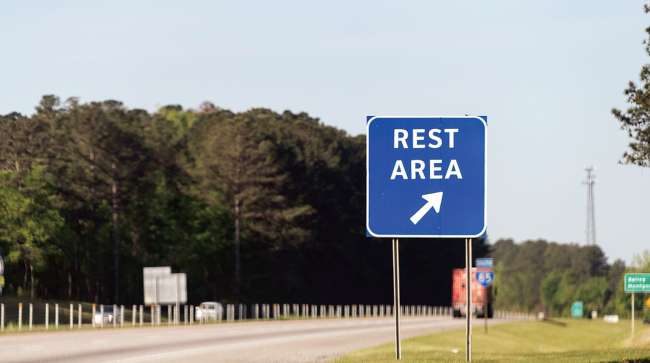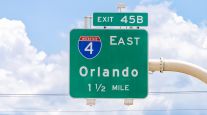Staff Reporter
Reason Foundation Report on Rest Areas Challenged by Truck Stop Operators

[Stay on top of transportation news: Get TTNews in your inbox.]
A report that suggests a longstanding prohibition on commercial services at interstate rest areas should be lifted is being opposed by a group representing private truck stops.
The “Rethinking Interstate Rest Areas” report, published April 8 by Reason Foundation, suggests that infrastructure improvements to the nation’s interstates should also be accompanied by new travel plazas that, among other services, expand the availability of truck parking. The report also states that the ban on commercial services prevents the addition of electric vehicle charging stations at rest areas on the interstate highway system — unless the electricity provided at these locations is offered for free to motorists and truckers. Other services that could be provided include electrical hookups to facilitate heating and air conditioning for sleeper berths, the report said.
The report also makes a financial argument for lifting the ban, noting that some state departments of transportation have closed interstate rest areas due to budget shortfalls.
However, opponents to commercialized rest areas — such as Natso, which represents truck stop owners and operators — have indicated the ban helps encourage private commercial activity in communities located near off-ramps. In a letter to Transportation Secretary Pete Buttigieg dated April 7, Natso and a coalition of industry groups urged him to protect the ban.
“This deeply flawed report by the Reason Foundation is part of their ongoing efforts to dismantle the federal government’s role in transportation policy,” Natso President Lisa Mullings told Transport Topics. “Rest area ‘privatization’ expands the role of government and government contractors. It displaces existing businesses who compete across the street from one another at highway exits. It results in higher costs to consumers, and lower quality.”
Another consideration is the blind community, which has priority to operate vending machines at rest areas and whose businesses may be threatened by commercialization at these locations, the letter noted.
The report argues that opposition to commercialization does not take into account the need to expand roadside services, especially as truck traffic and personal travel are projected to increase in the coming decades.
“The competition for gas stations and food purveyors at off-ramps would be with name-brand, tax-paying gas stations and food purveyors at the commercial rest areas,” if the ban were lifted, said Robert Poole, author of the report and director of transportation policy at Reason Foundation.
The ban dates back to a law that was adopted when the interstate system was coming into existence in the mid-1950s and early 1960s. In an effort to help local merchants, the legislation banned “toll-road style” commercial service plazas, the report stated.
The provision stated any construction project on an interstate highway that is receiving federal aid must contain a clause providing states will not add points of access to or exit from the project besides those originally approved by the Secretary of Transportation. Beyond that, these agreements must also provide that the state will not permit automotive service stations or commercial establishments to be constructed on the rights-of-way of the interstate system.
Want more news? Listen to today's daily briefing below or go here for more info:



